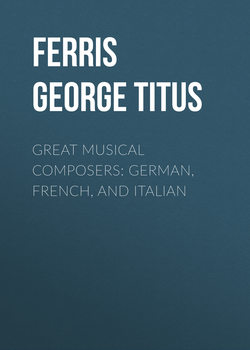Читать книгу Great Musical Composers: German, French, and Italian - Ferris George Titus - Страница 24
MOZART
IV
ОглавлениеMozart’s charming letters reveal to us such a gentle, sparkling, affectionate nature, as to inspire as much love for the man as admiration for his genius. Sunny humour and tenderness bubble in almost every sentence. A clever writer says that “opening these is like opening a painted tomb… The colours are all fresh, the figures are all distinct.”
No better illustration of the man Mozart can be had than in a few extracts from his correspondence. He writes to his sister from Rome while yet a mere lad: —
“I am, thank God! except my miserable pen, well, and send you and mamma a thousand kisses. I wish you were in Rome; I am sure it would please you. Papa says I am a little fool, but that is nothing new. Here we have but one bed; it is easy to understand that I can’t rest comfortably with papa. I shall be glad when we get into new quarters. I have just finished drawing the Holy Peter with his keys, the Holy Paul with his sword, and the Holy Luke with my sister. I have had the honour of kissing St. Peter’s foot; and because I am so small as to be unable to reach it, they had to lift me up. I am the same old
“Wolfgang.”
Mozart was very fond of this sister Nannerl, and he used to write to her in a playful mosaic of French, German, and Italian. Just after his wedding he writes: —
“My darling is now a hundred times more joyful at the idea of going to Salzburg, and I am willing to stake – ay, my very life, that you will rejoice still more in my happiness when you know her; if, indeed, in your estimation, as in mine, a high-principled, honest, virtuous, and pleasing wife ought to make a man happy.”
Late in his short life he writes the following characteristic note to a friend, whose life does not appear to have been one of the most regular: —
“Now tell me, my dear friend, how you are. I hope you are all as well as we are. You cannot fail to be happy, for you possess everything that you can wish for at your age and in your position, especially as you now seem to have entirely given up your former mode of life. Do you not every day become more convinced of the truth of the little lectures I used to inflict on you? Are not the pleasures of a transient, capricious passion widely different from the happiness produced by rational and true love? I feel sure that you often in your heart thank me for my admonitions. I shall feel quite proud if you do. But, jesting apart, you do really owe me some little gratitude if you are become worthy of Fräulein N – , for I certainly played no insignificant part in your improvement or reform.
“My great-grandfather used to say to his wife, my great-grandmother, who in turn told it to her daughter, my grandmother, who again repeated it to her daughter, my mother, who repeated it to her daughter, my own sister, that it was a very great art to talk eloquently and well, but an equally great one to know the right moment to stop. I therefore shall follow the advice of my sister, thanks to our mother, grandmother, and great-grandmother, and thus end, not only my moral ebullition, but my letter.”
His playful tenderness lavished itself on his wife in a thousand quaint ways. He would, for example, rise long before her to take his horseback exercise, and always kiss her sleeping face and leave a little note like the following resting on her forehead – “Good-morning, dear little wife! I hope you have had a good sleep and pleasant dreams. I shall be back in two hours. Behave yourself like a good little girl, and don’t run away from your husband.”
Speaking of an infant child, our composer would say merrily, “That boy will be a true Mozart, for he always cries in the very key in which I am playing.”
Mozart’s musical greatness, shown in the symmetry of his art as well as in the richness of his inspirations, has been unanimously acknowledged by his brother composers. Meyerbeer could not restrain his tears when speaking of him. Weber, Mendelssohn, Rossini, and Wagner always praise him in terms of enthusiastic admiration. Haydn called him the greatest of composers. In fertility of invention, beauty of form, and exactness of method, he has never been surpassed, and has but one or two rivals. The composer of three of the greatest operas in musical history, besides many of much more than ordinary excellence; of symphonies that rival Haydn’s for symmetry and melodic affluence; of a great number of quartets, quintets, etc.; and of pianoforte sonatas which rank high among the best; of many masses that are standard in the service of the Catholic Church; of a great variety of beautiful songs – there is hardly any form of music which he did not richly adorn with the treasures of his genius. We may well say, in the words of one of the most competent critics: —
“Mozart was a king and a slave – king in his own beautiful realm of music; slave of the circumstances and the conditions of this world. Once over the boundaries of his own kingdom, and he was supreme; but the powers of the earth acknowledged not his sovereignty.”
